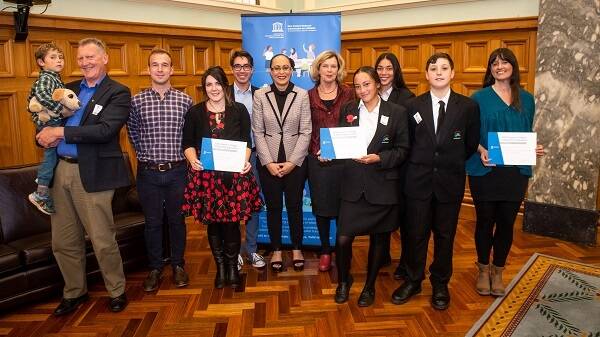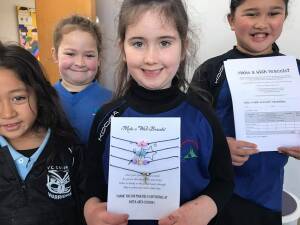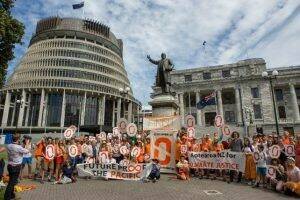Award in Global Citizenship Education winners announced
The New Zealand National Commission for UNESCO today announced the winners of its inaugural Award in Global Citizenship Education (GCED).
Award winners

The recipients are: Patea Area School (Education Sector), Generation Zero
(Community) and Tiaki Early Learning Centre (Innovation). St Johns College and
UN Youth were also highly commended.
Each winner received a certificate and $3000 at a prize giving ceremony and reception at Parliament, hosted by Hon Jenny Salesa, Associate Minister of Education.
“We were delighted by the quality of the applications we received,” says Robyn Baker, Chair of the New Zealand National Commission for UNESCO. “It was heartening to read about the outstanding work that is being done across the country to encourage responsible and active global citizenship.”
Patea Area School – Education Sector Award

Each term the school introduces an across school inquiry topic with a
local/global challenge focus. Every student in the school chooses an aspect of
the inquiry topic based on their area of interest, passion and need. This
inquiry work becomes the basis of each students’ personalised learning pathway.
Patea Area School worked to find a learning model that truly embedded global citizenship in the whole school’s curriculum delivery, instead of being a one-off project. This is reflected in the school’s vision statement of ‘Growing good people for a changing world’. The school’s approach is closely aligned with international goals for global citizenship education and the Sustainable Development Goals.
“In 2015, Patea Area School had some of the worst NCEA results in the country,” says Ms Baker. “They also had high suspension rates, low staff morale and a significant disconnection with the local community. The judges were impressed at how the learning model the school introduced has turned the school around and engaged the whole community. The model ensures that everything they do as a learning community is experiential, authentic and connected to the wider world around them.”
Generation Zero – Community Award

Generation Zero developed the Zero Carbon Act blueprint, aimed at creating
a thriving, zero carbon future in New Zealand.
The nationwide, youth-led organisation taught themselves and others about policy and government processes, media and communications, public outreach, interpersonal skills, training and supporting volunteers to get involved and upskill as well.
After 18 months of public education and awareness-building about climate change and the benefits of climate law, the new government agreed to create and pass a Zero Carbon Act into law. The work of Generation Zero contributed to this outcome.
“The judges were particularly struck by the strong evidence of impact and its contribution to long-term societal change, as well as the fact that the initiative is youth led,” says Ms Baker. “They were also impressed by the way in which members of Generation Zero are educating volunteers across the country.”
Tiaki Early Learning Centre – Innovation Award

The Centre’s project ‘Te Arohanui o Papatuanuku’ provides opportunities
for tamariki aged between three and five to lead by example in their role as
Kaitiaki o Papatuanuku – guardians of the land. The young children are
encouraged to act as leaders in projects to reduce waste and foster sustainable
living practice. This includes picking up litter as they walk through the
community, and looking after a section of wetlands in the local area, among
other projects.
“The judges were excited by the early learning centre’s approach, which is embedding important values in the tamariki that will likely grow as they get older,” says Ms Baker. “It’s a simple but powerful idea, which adopts innovative use of local knowledge and tikanga.”
The early learning centre is working with the local community to establish and sustain the Tiaki way of being in the world; drawing on Te Whariki, ideas of place-based education, using Nature pedagogy, and enabling the children to take action in areas related to the health of mother earth. They are also providing opportunities for the children to be leaders “through the actions they do every single day”.
About Global Citizenship Education
The New Zealand National Commission for UNESCO’s definition of Global Citizenship Education (GCED) is ‘empowering learners to engage and assume active roles, both locally and globally, to face and resolve global challenges and ultimately to become proactive contributors to a more just, peaceful, tolerant, inclusive, secure and sustainable world’.
GCED is for learners of any ages, from both formal and non-formal settings.
UNESCO’s work in this area is guided by the Education 2030 Agenda and Framework for Action, notably Target 4.7 of the Sustainable Development Goals (SDG 4 on Education), which calls on countries to: “ensure that all learners are provided with the knowledge and skills to promote sustainable development, including, among others, through education for sustainable development and sustainable lifestyles, human rights, gender equality, promotion of a culture of peace and non-violence, global citizenship and appreciation of cultural diversity and of culture’s contribution to sustainable development.”
The judges selected the projects that aligned best with the National Commission’s definition of GCED, as well as Target 4.7. Applicants needed to demonstrate that their project contributes to a significant issue/s at a local, regional or national level. They also needed to provide evidence of their project’s impact on learners’ ability to be active and responsible global citizens.
